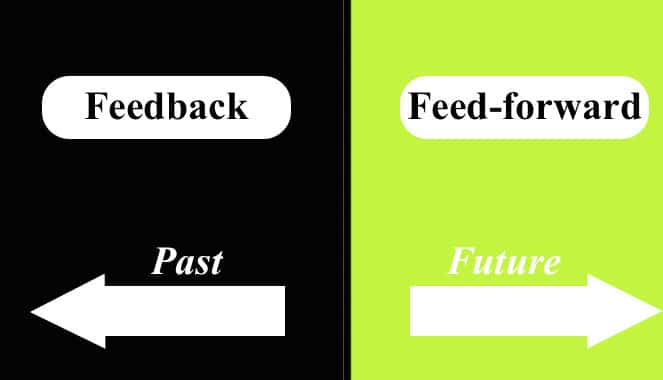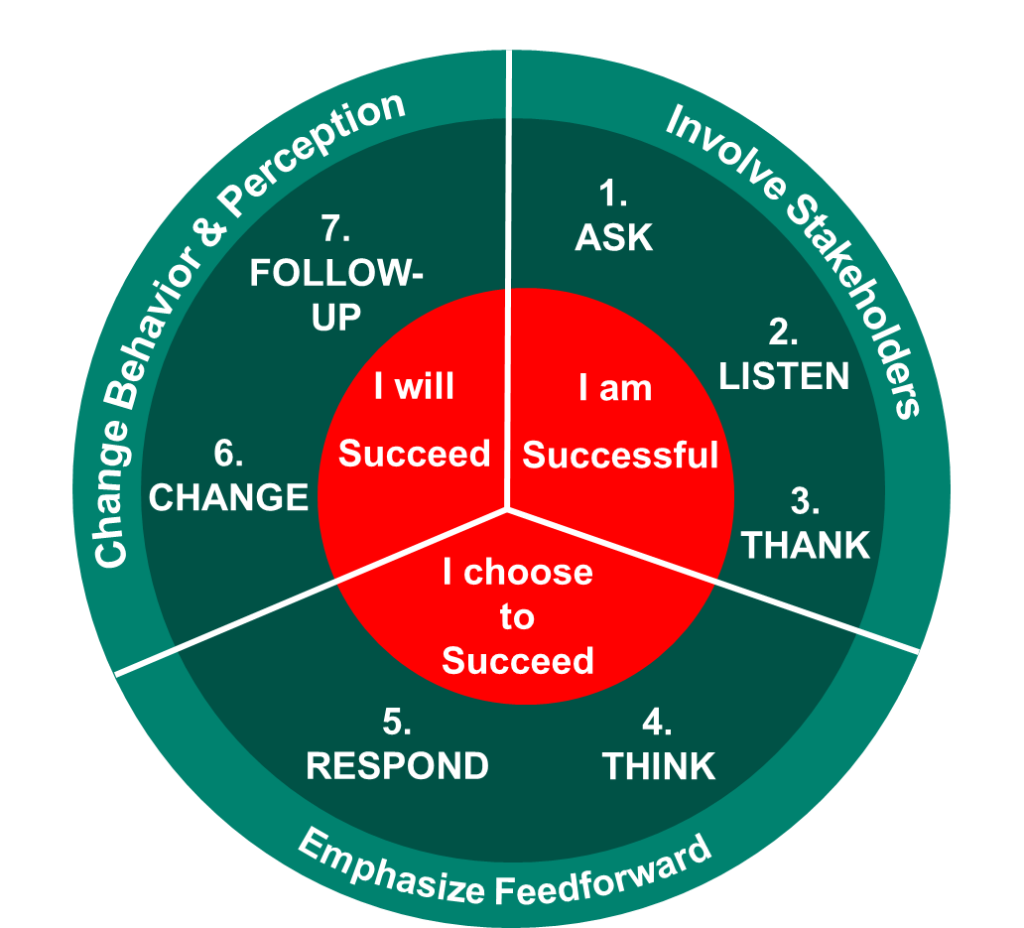
Leadership lesson I learned from my son about feedback vs. feedforward
I learned a valuable leadership lesson from my son (many years ago) and got to practice feedback vs. feedforward.We know what feedback means. We give and receive feedback regularly at work and also in personal life. The concept of feedforward was pioneered by Dr. Marshall Goldsmith is considered the world’s number one leadership thinker. He also pioneered his highly effective leadership coaching process through the concept of feedback vs. feedforward.
My interaction with my son and the leadership lesson therein
I have two sons – both are now adults. My elder son is three years older than the younger one. This incident was from many years ago when both were much younger.
One day, when I returned from work, my younger son came to me. He looked a little upset. I asked him what the matter was. He replied in an emotional tone – “Dad, you don’t love me as much as you love my brother. He is your favorite!” If you are a parent of more than one child, I am sure you must have had a similar conversation with your children!
The feedback came as a shock to me, as I truly believed that I loved both my boys equally. It didn’t match with how I perceived the situation.
How do I respond to this feedback? I had several ways to respond to this situation.
Option 1 to respond to the feedback – Reject it!
I could simply reject the feedback as it didn’t fit how I saw it. My response would be – “Son – what are you talking about? This is nonsense. I love you both equally. Don’t make such baseless accusations and never say that I love you any less.”
Here is a question to ponder. Would this response help change my son’s perception that I loved him less than I loved his elder brother? What do you think? The leadership lesson here – If you are a leader, should you reject any feedback you disagree with?
Option 2 to respond to the feedback – reason with it
I could reason with him and prove how I treated both of them fairly and equally. The conversation would be – “Look, son! Whenever I bring candies or goodies, I bring them for both of you. We celebrated the birthdays of both of you. I bought birthday presents for both of you. I treat you both equally, and I love you both the same. Please don’t say that I love you any less.”
Again, the question is – Would this response help change my son’s opinion that I loved him less than I loved his elder brother? What do you think? The leadership lesson here – as a leader, does reasoning with people change their perceptions about you?
Option 3 to feedback vs. feedforward – accept and acknowledge feedback and ask for feedforward.
Here is the third option. I could simply accept the feedback unconditionally and acknowledge my son’s feelings. Here is how the conversation would go – “Son, I am sorry that you feel that way. What can I do in the future so that you feel that I love you as much as I love your brother?”
Now, this is the feedback vs. feedforward approach. Feedback focuses on the past. It tends to blame the person for past actions that cannot be undone. No amount of blame, regret, or guilt can change the past.
On the other hand, feedforward is future-oriented. It is asking for suggestions for the future to address the issue. While nothing can be done to change the past (feedback), suggestions for the future (feedforward) offer unlimited possibilities. Feedforward is action-oriented. Feedback is just talking about what has already happened. There is a huge leadership lesson in understanding the difference and using feedforward vs. feedback.
So when I used the feedback vs. feedforward approach with my son and asked him for suggestions for the future – there was an uncomfortable silence for a couple of minutes. He probably didn’t expect this response, which is not unusual. People use feedback to complain and vent out. I could see that he was thinking hard, trying to come up with an answer. He then replied with strong emotions again – “Dad, you are always discussing all kinds of things with my elder brother. Politics, technology, sports, and more. You never discuss anything with me!”
My first reaction was to explain the fact that he was three years younger and probably wouldn’t understand many of the things I discussed routinely with my elder son. I wanted to assure him that in three years when he would be the same age as my elder son, I would be happy to discuss those topics with him as well. But I paused and thought about it.
Again the question is – Would that reasoning address his concerns? Would that line of conversation change his perception? What do you think? I think probably not! The leadership lesson here – do logical explanations help in changing other’s perceptions about you?
So I tried another response – feedforward vs. feedback!
Here is how the conversation progressed.
“Son – what topics would you like to discuss with me? Do you like politics?”.
He retorted – “Dad, I don’t like politics. I have no interest in discussing politics.”
I asked – “How about sports?.”
His eyes lit up. He said – “Dad, I would love to discuss sports with you.”
I asked – “What is your favorite sport?.”
“I love cricket!” – he replied.
“Which team is your favorite?” – I asked.
“Indian national cricket team.” – he replied.
“Who is your favorite player?” – I asked.
“Virat Kohli,” – he said excitedly.
“What other teams do you like?” – I added.
“I love IPL. Chennai Super Kings is my favorite team!” – He replied again excitedly.
“Who is your favorite player in that team?” – I queried.
“M.S. Dhoni.” – He reverted quickly.
“Great!” – I said.
And the conversation ended.

Changing my behavior and changing his perception through feedback vs. feedforward
Although I am not a big fan of cricket, I started paying attention to cricket over the next few weeks. I started Googling for scores of the Indian national cricket team and the Chennai Super Kings team. I also started checking how Virat Kohli and M.S.Dhoni had performed. It would take me a couple of minutes of internet browsing to “catch up” on what was happening in the sport of cricket and especially with my son’s favorite teams and players.
I would then discuss the scores and the results with my son after I reached home from work—especially the performance of his favorite teams and the favorite players. I would start the discussion, and he would excitedly fill in the rest of the details! He was well informed about cricket as it was his passion.
So here is the question. Would this third option help change my son’s perception that I loved him a little less than I loved his elder brother? What do you think?
Which of these three options are most likely to change my son’s opinion? The answer is obvious. As actions speak louder than words, my efforts to implement his suggestions to make him feel loved would go a long way towards changing his perception. If I continued working on his suggestions for a sufficient period, the change in his perception would be certain.
There are quite a few leadership lessons here.
First leadership lesson
If the people around you, family members or team members at work, are important to you and regularly get feedback from them. Without feedback, there is little chance of improvement – both at work and in personal life.
Second leadership lesson
As a leader, you have to ACT on that feedback regularly.
Third leadership lesson
Changing your behavior and changing other’s perceptions go hand in hand!
Read: What Got You Here Won’t Get You There-Marshall Goldsmith-Book summary
Another leadership lesson – Feedback is just that – Feedback!
Was my son’s feedback wrong? (that I loved him less than I loved his brother). Was my perception wrong – that I loved both my sons equally? Therein lies the interesting dynamics. From his perspective, my son was right. He saw me interacting with my elder son regularly and felt left out. His perception was that I was ignoring him or that he was not important to him. On the other hand, I was right as well. I sincerely loved both my children. I had no intention of loving one of them more than the other. Both perceptions can be proven right, and both can be proven wrong. Basically, feedback is just that. Feedback is feedback – it is neither right nor wrong!
Feedback is a gift

When someone is willing to share their feedback in your presence, it is a gift! They could have chosen to talk about you or your performance behind your back, but they dared to share it with you. It allows us to get better. All feedback can be a gift if we can just put our egos aside and are willing to listen. There cannot be any improvement without feedback.
Had I not listened to my son’s feedback, he could have carried the misconception that he was loved less probably for the rest of his life. This feedback allowed me to course correct and address both my behavior and his perception.
Read: Feedback is a gift – leadership feedback is a huge favor
Dr. Marshall Goldsmith’s feedback vs. feedforward for coaching leaders
Although I didn’t know it back then, I applied the process of “feed-forward” pioneered by the world’s number 1 leadership thinker Dr. Marshall Goldsmith. Dr. Marshall Goldsmith has used this simple yet powerful process to coach CEOs at Fortune 500 companies.
The seven steps of feedforward are
- Ask
- Listen
- Thank
- Think
- Respond
- Change
- Follow up

Our leadership coaching using Marshall Goldsmith’s Stakeholder Centered Coaching is based on three primary concepts.
- Feedback
- Feed-forward
- Follow up
We offer Marshall Goldsmith coaching in India, around the globe It is the best coaching program because it is the same executive coaching process used by Marshall Goldsmith to coach CEOs of Fortune 500 companies worldwide. We guarantee measurable leadership growth or don’t pay at all.
Read: What are the best executive coaching programs & the top executive coaching firms?
Develop your leaders using feedback vs. feedforward
Most leadership development programs have little business impact. The main reason is that they are intellectual in nature. There is no application at work and little in terms of behavior change at work.
Our coaching program using feedback and feedforward has an effectiveness rate of 95%. How do we measure success? By measuring the change in leadership behaviors at work – rated anonymously by the leader’s team members.
NAL Triple Advantage Leadership Coaching.
That delivers guaranteed and measurable leadership growth. It is based on a stakeholder centered coaching process with a 95% effectiveness rate (in a study or 11000 leaders on 4 continents). It is used by companies ranging from startups to 150 of the Fortune 500 companies to develop their leaders.
Here are some of the salient benefits of NAL Triple Advantage Leadership Coaching
Time and resource-efficient: The leader does not have to leave work to attend training programs. We go to the leader and her team. And it only takes 1.5 hours per month. The rest of the time, the leader is working to implement with her team.
Separate and customized improvement areas for each leader: Every leader is different. One size fits all approach doesn’t work. Individual development areas for each leader aligned to the business strategy.
Involves entire team: Unlike most leadership programs, NAL Triple Advantage Leadership Coaching involves the leader’s entire team, and it has a cascading effect – increasing the team effectiveness and improving organizational culture.
The leader becomes the coach: for continuous improvement for leaders themselves and their teams. It is like kaizen for your leadership development.
Cost-Effective: Our entire one-year coaching engagement often costs less than sending the leader to a short duration leadership program at any reputed B school.
Guaranteed and measurable leadership growth: as assessed – not by us – but anonymously rated by the leader’s own team members.
Pay us only after we deliver results!: We work with many of our clients on a pay for results basis. What does it mean? If the leaders don’t improve, you don’t have to pay us.
Schedule an exploratory 15-minute conversation with our leadership adviser today
Click the button below.
Below is the video version of the article


